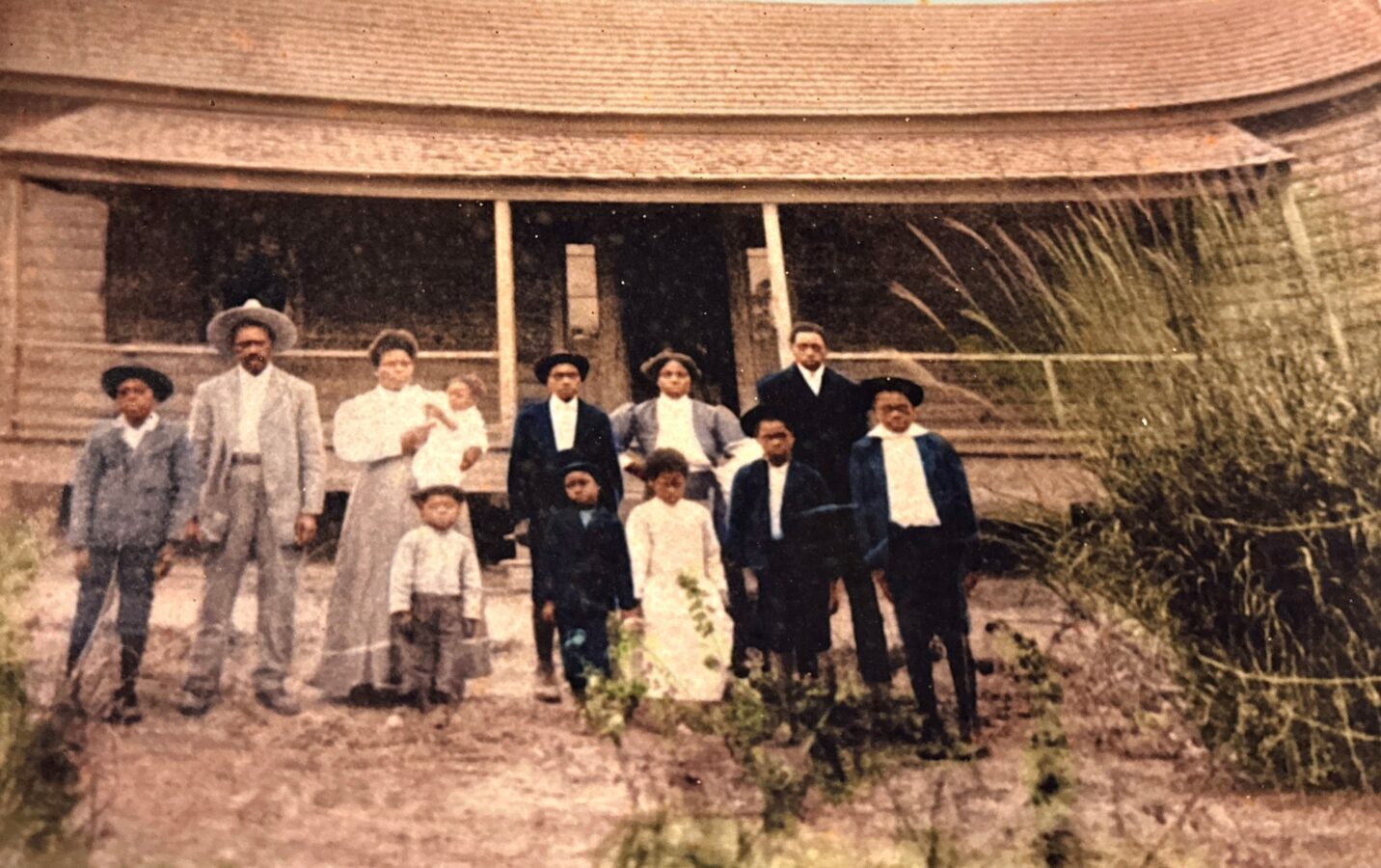As the grandson of Black farmers, sharecroppers, and farmworkers, I know firsthand how the injustices faced by small farmers and workers plague and hinder our food supply.
My grandfather, Frederick Henry Blanding, was a third-generation farmer and descendant of slaves. During his lifespan, most people ate locally sourced and homegrown foods. While Granddaddy Frederick loved farming, he faced such severe discrimination and anticipated the endangered state of small farmers that he swayed my father and his siblings away from farming. He foresaw then what we know now: Our food and farming system was never designed to support Black, Indigenous, and people of color (BIPOC) workers and small farmers who toil to produce our agricultural goods.
Though the Biden-Harris administration has made concerted efforts to course correct our unjust food and farming systems, there’s much more work to be done; transformational and equitable change cannot be relegated to one presidential administration. It must be indelibly imbued into our public policies. In federal food and agricultural policy, the best vehicle to achieve this change is the food and farm bill.
The birth of an unjust agricultural system
From plantations to sharecropping, since its inception the U.S. food and farming system was built on systems of oppression that excluded Black farmers and exploited food system workers. It continues to consolidate land into the hands of the wealthy few and stifle access to nutritious food through what activists have termed food apartheids, denoting severe segregation and discrimination. The inequities we see today—a dying Black farmer population, riskier operations and inaccessible resources for BIPOC farmers, longstanding racism at the US Department of Agriculture (USDA), and health disparities from unequal food access—are direct products of ongoing systemic racism and systematic exclusion.
The current state of our food and faming system was born from the plantation system in the antebellum South that displaced and stole land from Indigenous nations and exploited Africans and their descendants through forced slavery. Through this caste system, a few wealthy white landowners grew larger plantations and held most of the land. They aimed to maximize profits by exploiting humans and the environment through cheap labor, human commodification, and maximizing yields of a few commodity crops that degraded the soil.
After the antebellum plantation system ended, exploitative and oppressive systems continued through the sharecropping system. The newly freed men and women desired land from the government, which resulted in an ordinance for the redistribution of 400,000 acres of land from South Carolina to Florida for the four million freedmen. However, the promise of reparations was rescinded by President Abraham Lincoln’s successor President Andrew Johnson in 1865.
At the end of the Reconstruction era, with the withdrawal of federal troops from the South, landholding remained out of reach for Black and poor white people. They began entering contracts to access small plots of farmland in return for shares of their crop yield, establishing the new sharecropping system. Alternatively, if the farmer had the assets and equipment, they would rent land as tenant farmers and were kept from owning the land.
The rise of exclusionary farm policies
The USDA was established in 1862 and termed “the People’s Department” by President Lincoln during a time when our food and farming system looked fundamentally different. Ninety percent of Americans farmed, and most Black farmers were still enslaved. Though they continued to struggle with violence, oppression, exploitation, and social exclusion post-slavery, formerly enslaved Black farmers, like my great-great grandfather John Henry Blanding, slowly acquired land. As noted in a UCS report, by 1920 there were 920,000 Black farmers making up 14 percent of all farmers and owning 15 million acres of farmland.
However, 60 years later, the number of Black farmers dwindled by 95 percent and they lost 80 percent of farmland, a change which is directly attributable to the continued exclusion of Black farmers from USDA programs, political power by anti-Black local USDA offices, and complex legal trickery through heirs’ property.
Like many small farmers, my great-great grandfather lost his farmland during the Great Depression and Dust Bowl, an unprecedented disaster caused by natural forces and human depletion of the soil from overproduction and intensive monoculture farming. In response, the first farm bill, the Agricultural Adjustment Act of 1933 (AAA)—a component of the New Deal—incentivized reducing production to raise crop prices through subsidy payments and established county committees controlled by racist elite plantation owners in the South who helped determine and distribute these subsidies.
Additionally, USDA implementation of the policies excluded tenant farmers and sharecroppers as eligible farmers. Both Republican and Democratic members of Congress highlighted the need for “fair and equitable treatment” of sharecroppers, small farmers, and tenant farmers, but the USDA continued to silo them from needed resources. Many landlords evicted their tenant farmers and sharecroppers as they invested in new machinery, and policymakers continued to support the emergence of industrialized agriculture.
The Farmers Home Administration (FHA), established in 1946, continued to favor large-scale white farmers through local offices managed and controlled by local county committee members who promoted anti-Black racism and barely considered Black farmers in USDA programs and services. Black farmers tried to hold together by forming cooperatives. However, due to ongoing farm consolidation, lack of access to new technological advancements, and longstanding discrimination as noted in the Pigford class action suit settlements and the Commission on Civil Rights reports in 1965 and 1982, today there are only 41,807 Black farmers. That is only 1.2% of all farmers.
Though a few programs have been established to support underserved farmers, the food and farm bill has mostly maintained the status quo with inequitable subsidy payments, exclusionary policies, and localized power that continue to deny access to workers and Black farmers.
 My great-great grandfather John Henry Blanding (second from the left) stands with his family on the 400-acre family farm in the early 1900s.
My great-great grandfather John Henry Blanding (second from the left) stands with his family on the 400-acre family farm in the early 1900s. A path towards food and farm justice
Because of the work of advocates and coalitions, the Biden-Harris administration has pursued a comprehensive approach to address this sordid history of inequality and injustice entrenched in our nation’s food supply chain, especially within the USDA. This includes establishing the USDA Equity Commission, appointing Dr. Dewayne Goldmon as the first Senior Advisor for Racial Equity reporting directly to the Secretary of Agriculture, and creating an Equity Action Plan. However, these practices can be easily rolled back with another unfavorable presidential administration. As such, we need a fundamentally transformative shift in how the food and farm bill is designed to stop the bleeding and near extinction of Black farmers.
As a former UCS colleague previously noted, sustainability and justice are not siloed issues but must be seen and addressed as systemically interrelated. Congress has the responsibility to address the burdens and barriers Black farmers face and transform our food and farming system into one of equity and justice.
There are several bills recently introduced in Congress that would build a more sustainable, resilient, and equitable food and farming system that farmers, workers, and communities need and deserve. UCS appreciates that Senate Agriculture Committee Chairwoman Debbie Stabenow of Michigan included many of these provisions in a Senate food and farm bill proposal that was released in early May, in advance of a full Senate bill which we anticipate will be introduced in the near future.
The upcoming food and farm bill is Congress’ chance to right the wrongs of the past and move us out of the darkness of discrimination and anti-Black racism and into the dawn of equity and justice for Black farmers. UCS urges Congress to step up and make equity and racial justice the forefront of the next food and farm bill to ensure the dignity and future of farmworkers, food system workers, and Black farmers.

 6 months ago
52
6 months ago
52


